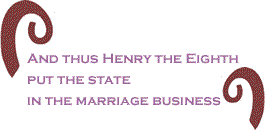
|
|||||||||||||||||||||||

|
|

Custom Search
|
|
 |
|
In Western Civilization, there is no greater sacred religious ritual than the burning of heretics at the stake. A communal affair, the site of the ceremony was the public square. True believers considered it quite an honor that they might contribute faggots to be consumed on this most holy of occasions. The bundles of sticks were blessed by the highest ranking member of the clergy available so the heretics might be consumed by holy flames on this most holy of days. But not just any holy day where evil would be denounced and good would triumph but a festive holy day where everyone would take off from work and celebrate the righteousness of their beliefs as a community of the faithful. To be fair and just, (and capital punishment must always be seen as fair and just to be tolerated), the heretics would be given an opportunity to repent of their evil ways and die begging forgiveness. Such a decent death was said to make a difference for them in the afterlife but would not stop the show in this life. For the roasting would go on. Indeed, the show had to go on! How else to teach the lesson of what happens to those who stray too far or seek too much change or who are simply too different? Forgive the sin but burn the sinner! And a good time would be had by all, excepting, of course, the poor and unlucky soul whose presence was the “reason for the season,” to coin a phrase. On such an occasion, who could resist a full-throated singing of a verse or two of “Onward Christian Soldiers”? The most recent example of this modern attempt to cleanse the community of heretics is Proposition 8 and whether the state should perform same-sex marriages. How did we get worked up into this frenzied madness - this modern burning at the stake? Blame Henry the Eighth, the King of England, who wanted a divorce (really an annulment) from one of his several serial wives but could not obtain permission from the Catholic Church who ruled over all religious rituals. So in 1534, Henry, not to be frustrated in his kingly proclivities, proclaimed himself the Head of the (new) Church of England, and had its Chief of Ritual Protocol, the Archbishop of Canterbury, grant him an annulment. And thus Henry the Eighth put the state in the marriage business. In reaction to this merger of state and church came the political belief enshrined in the First Amendment that the State and the Church should remain separate.
Proposition 8 is a good example of how asking the wrong question doesn’t help in getting the right answer. Here’s the problem. When you go after heretics, you assume that the faithful are on the one true path and the heretic has strayed from the walkway of righteousness. But there are at least two other distinct possibilities, one of which, in all the debate about proposition 8, did not get much consideration. Hence, the need for this intervention.
This is the trouble with asking the wrong question. It forces you to debate about equally wrong answers, only one of which is “right” according to the true believers on each side of the issue. But there is a third possibility. This possibility agrees with all those “sexuals” - both hetero and homo - who believe that marriage is a sacred religious ritual in which two people are united as one in the eyes of God. This “third alternative” is that the State will no longer be in the marriage business but instead will only be in the civil union business. It is the position that the Supreme Court of California should adopt as a way of getting us out this Stygian quagmire in which we are drowning, if not burning. (The Styx, of course, is poisonous and corrosive but does not burn; that distinction belongs to the Cuyahoga River in Ohio, Patron River of the Modern Environmental Movement.)
If you want to be married in the eyes of your faith tradition (name your own poison), you must be married by the designated practitioner of that rite. And the blessings of the denominational gods will be upon you. But if you want to be united in the eyes of the State, which does not and cannot recognize a one true religious tradition, then you must have a civil union. In the civil union, two people are united in the eyes of the State and thereby get all of the perquisites which go with that civil union, including joint tax returns, family health care coverage, probate espousal determinations, et cetera. And the biggest of prize of them all - the civil divorce - which is not possible in some religious traditions.
The California Supreme Court should rule that from henceforth the state will only recognize civil unions. Every citizen would have a choice: they could be married and not have a civil union (in which case no recognition of their marriage by the state); they could have a civil union and no marriage (in which case no recognition by a faith tradition); or they could have both a marriage (if their religion permits) and a civil union in which case they would secure the blessings of life, liberty, and, the erstwhile pursuit of happiness on themselves and their posterity by God and country. How American is that! It
would be an entirely Christian thing for the Court to do. In effect,
the California Supreme Court would render to Caesar the things
that are Caesar’s and to God the things that are God’s. And then
we can all begin debating the next burning topic. In the Christian
biblical tradition of the New Testament, divorce after marriage
is not permitted - “let no one put asunder what God has joined
together.” BlackCommentator.com Guest Commentator, Wesley Profit, is an LA-based writer and satirist. Click here to contact Mr. Profit. 1Some would argue that lynching, a truly American ritual, which still happens on occasion, is a civic ceremony more akin to “burning at the stake,” but lynching has always been a rather poor and uncivil substitute - extra-legal, lacking in pomp and circumstance, and thus only vaguely reminiscent of the celebratory and communal aspects of pyre and fire. |
|
Any BlackCommentator.com article may be re-printed so long as it is re-printed in its entirety and full credit given to the author and www.BlackCommentator.com. If the re-print is on the Internet we additionally request a link back to the original piece on our Website. Your comments are always welcome. eMail re-print notice
If you send us an eMail message we may publish all or part of it, unless you tell us it is not for publication. You may also request that we withhold your name. Thank you very much for your readership. |
|
| |
|
| January
8, 2009 Issue 306 |
|
| Executive Editor: Bill Fletcher, Jr. |
| Managing Editor: Nancy Littlefield |
| Publisher: Peter Gamble |
| Est. April 5, 2002 |
Printer Friendly Version
in resizeable plain
text format or pdf
format. |
| Frequently Asked Questions |
 |

|
 |
 |
 |
| |
| |






























 We
Americans, enlightened practitioners of the separation of church
and state as set forth in our constitution, no longer literally
burn heretics at the stake.
We
Americans, enlightened practitioners of the separation of church
and state as set forth in our constitution, no longer literally
burn heretics at the stake. One
possibility is that the faithful are off on an ecclesiastical
frolic and detour and the heretic, though not within the body
of the faithful, nevertheless, treads the true path. This position
is easily recognized as the position of the martyr. No less a
person than Joan of Arc was burned at the stake at Rouen, France
in 1431 and would die claiming the righteousness of her beliefs;
and no less a person than Pope Benedict XV in 1920 would canonize
Joan of Arc a Saint of God. My how times did change when you recall
that Joan of Arc had been sent to the stake by good Roman Catholic
true believers. It turns out they were wrong. Joan of Arc was
on the one true path and those who burned her were on some other
path - most likely the good-intentioned path of we-know-what-God-wants.
Joan of Arc, of course, got her reward in heaven. And some among
us, for reasons known only to God, would consider that a poor
consolation prize, given that she had to give up her life to win
it. But the Christian version of the Price of Belief is Right
has always been a high stakes game. The wager is eternity and
behind one door is heaven and behind the other door is hell.
One
possibility is that the faithful are off on an ecclesiastical
frolic and detour and the heretic, though not within the body
of the faithful, nevertheless, treads the true path. This position
is easily recognized as the position of the martyr. No less a
person than Joan of Arc was burned at the stake at Rouen, France
in 1431 and would die claiming the righteousness of her beliefs;
and no less a person than Pope Benedict XV in 1920 would canonize
Joan of Arc a Saint of God. My how times did change when you recall
that Joan of Arc had been sent to the stake by good Roman Catholic
true believers. It turns out they were wrong. Joan of Arc was
on the one true path and those who burned her were on some other
path - most likely the good-intentioned path of we-know-what-God-wants.
Joan of Arc, of course, got her reward in heaven. And some among
us, for reasons known only to God, would consider that a poor
consolation prize, given that she had to give up her life to win
it. But the Christian version of the Price of Belief is Right
has always been a high stakes game. The wager is eternity and
behind one door is heaven and behind the other door is hell. 
 It
is time for the California Supreme Court to cut the Gordian knot
of Henry the Eighth’s convenient merger of church and state. The
Supreme Court of California can return us all to that blissful
state, envisioned by our forebears, wherein the state and its
civil rituals are separated from the church and its religious
practices. All can agree that marriage is a religious ritual.
All should agree that the State has no business performing
religious rituals. (If you think otherwise, then why should the
state not perform baptisms or better yet circumcisions, a practice
commonly occurring in all the Abrahamic religious traditions -
Jewish, Christian, and Muslim?) “How dare, you say. Blasphemy,
you say!” Such an unkind cut! Then you must surely agree the State
should perform only civil ceremonies - such as civil unions.
It
is time for the California Supreme Court to cut the Gordian knot
of Henry the Eighth’s convenient merger of church and state. The
Supreme Court of California can return us all to that blissful
state, envisioned by our forebears, wherein the state and its
civil rituals are separated from the church and its religious
practices. All can agree that marriage is a religious ritual.
All should agree that the State has no business performing
religious rituals. (If you think otherwise, then why should the
state not perform baptisms or better yet circumcisions, a practice
commonly occurring in all the Abrahamic religious traditions -
Jewish, Christian, and Muslim?) “How dare, you say. Blasphemy,
you say!” Such an unkind cut! Then you must surely agree the State
should perform only civil ceremonies - such as civil unions.






